So here we are together again, embarking on another pool season. To us, a new pool season means another year of enjoying the good weather while barbecuing with friends and family around the pool. In fact, I can almost taste the barbecue now. Are you ready for it? Better yet, is your pool ready? Believe it or not, most pool owners get a late start in opening their swimming pools for the season. Sure, there are a few factors that play a role in determining when to open the pool, e.g. the weather, money, time, and opportunity.
Still, even if you have certain things holding you back from physically opening the pool, there are things you can do to jump- start the preparation. Most of the time, pool owners don’t actually realize they are falling behind schedule until it’s too late. Trust us, we encounter the “last- minute- motor- shopping” stories every season. If we polled pool owners to check who were confidently ready to open their pools, how many of you could say yes? My guess is the majority of pool owners will say no. Either way, let’s explore the five areas all pool owners should check before opening their pools.
1. Turn ON and Run Your Equipment
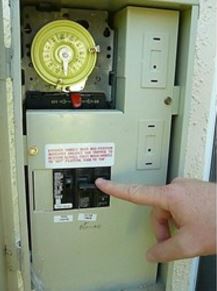 Here’s a serious question, when is the last time you ran your pool equipment? Seriously. Pool equipment is very similar to an automobile in the sense that if you don’t operate it frequently, it may have some trouble starting. So, first and foremost, you want to make sure your equipment is running smoothly and no leaks are present. Fire your system up and carefully look for water leaks around the equipment. You also want to ensure not too much air is getting back into the system or blowing back into the pool returns. A little blow back is okay, but too much can affect the system’s functionality.
Here’s a serious question, when is the last time you ran your pool equipment? Seriously. Pool equipment is very similar to an automobile in the sense that if you don’t operate it frequently, it may have some trouble starting. So, first and foremost, you want to make sure your equipment is running smoothly and no leaks are present. Fire your system up and carefully look for water leaks around the equipment. You also want to ensure not too much air is getting back into the system or blowing back into the pool returns. A little blow back is okay, but too much can affect the system’s functionality.
Other Related Content:
How To Identify and Correct Air Leaks
How To Determine Why a Motor Won’t Start
2. The Equipment
Once you have your equipment on, leave it running for approximately 30 minutes. This allows each piece of equipment to cycle on and gives it time for any technical issues, if any, to present itself. A piece of equipment to pay special attention to is your filter. We cannot express how important this inspection is. The filter is one of the most important parts of your swimming pool. It helps to keep your water chemistry in line, pool clarity up to par, and it can even help extend your motor’s longevity.
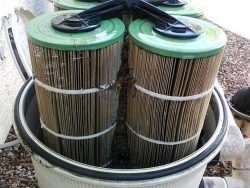 If your motor is pushing water through your filter but your filter is dirty, worn down, or simply backed up, then you’re actually putting more strain on your motor than necessary. This can wear down your motor before you get into the heart of your pool season. Trust us, no one wants to replace their pump motor by the 4th of July. Make sure to check for high-pressure readings, dirty cartridges or even filter elements with broken bands. If you have a D.E. filter, make sure to check for D.E. powder in the swimming pool. All of these areas can have a negative affect the operation of your swimming pool system.
If your motor is pushing water through your filter but your filter is dirty, worn down, or simply backed up, then you’re actually putting more strain on your motor than necessary. This can wear down your motor before you get into the heart of your pool season. Trust us, no one wants to replace their pump motor by the 4th of July. Make sure to check for high-pressure readings, dirty cartridges or even filter elements with broken bands. If you have a D.E. filter, make sure to check for D.E. powder in the swimming pool. All of these areas can have a negative affect the operation of your swimming pool system.
When it comes down to checking the pool equipment, most pool owners neglect their maintenance equipment. Maintenance equipment includes your pool cleaner, vacuum hoses, nets, brushes and telescopic poles. These are absolutely necessary for maintaining a clean pool. If you forgot to run your pool cleaner in the first step, here’s another opportunity to start it up. Let your cleaner run for 10 to 15 minutes before inspecting for worn down parts. Between the chlorine and the sun, small parts and bristles tend to deteriorate faster. Run your hand along your brushes to ensure your bristles are intact. Also, we recommend you check your nets for enlarged or stretched holes.
Other Related Content:
5 Signs You Need to Replace Your Filter Cartridge
When Should I Replace My Pool Filter O-Ring?
5 Biggest Problems With Pool Filters
3. Bugs, Bugs, and More Bugs
Although this is a rather simple step it’s also very important. In fact, it’s proven to save pool owners huge headaches down the line. Insects, bugs and other rodents in the wrong areas create nuisances for pool owners. It’ll shock you to see some of the things pool owners have seen inside their pool lines and  equipment. It’s always a good idea to check for ant hills, lizard nests, and bee or wasp hives. Be sure to check areas like your motor, filter, timer, and even your breaker panels. Bugs find all sorts of different places to hide. Always keep some pesticides handy, a water hose or even just a good old fashion wipe- down rag. Trust us, it’s the little things that matter.
equipment. It’s always a good idea to check for ant hills, lizard nests, and bee or wasp hives. Be sure to check areas like your motor, filter, timer, and even your breaker panels. Bugs find all sorts of different places to hide. Always keep some pesticides handy, a water hose or even just a good old fashion wipe- down rag. Trust us, it’s the little things that matter.
Other Related Content:
Horned Nosed Beetles and Above Ground Pools
4. The Water
Now that we already checked our systems for air leaks, good filtration, and rodents, we can move on to one of the biggest curve- ball scenarios pool owners find themselves in:  water chemistry. Most pool owners assume that since their pool had no algae blooms or sudden drops in chlorine levels during the offseason that their pool should be fine. This is not the case at all.
water chemistry. Most pool owners assume that since their pool had no algae blooms or sudden drops in chlorine levels during the offseason that their pool should be fine. This is not the case at all.
If you drained your pool and haven’t used shock or tablets, you probably find yourself in one of those curveball scenarios. Once your stabilizer (CYA) drops, it’s only a matter of time before you start to see algal blooms. You usually start to see algal blooms once the temperature rises again. In short, algae are no fun. Get your water tested ASAP. Make sure your levels are up to par as soon as you get your system up and running.
Other Related Content:
How to Balance Your Pool Water
Water Chemistry For Saltwater Pools
Maintaining an Above Ground Pool
5. Entertainment Area
Lastly, do you have basic entertainment stored away in your storage? If not, here’s the perfect opportunity to ensure your pool is party ready. Simple lounge chairs, toys, and umbrellas add excitement and beauty to your pool. Ultimately, this is what it’s all about- creating an environment full of peace and relaxation. You can’t prepare yourself enough for that.
Even if you haven’t opened your pool yet or don’t plan on doing so for another few weeks, consider checking these 5 areas out anyway. No, these five areas aren’t guaranteed to save a dying pool, however, it can give you a jump start in preparing your pool for the summer fun ahead.
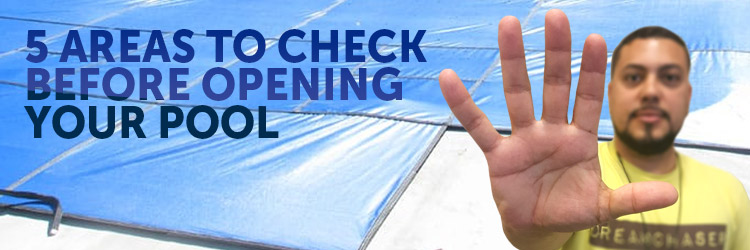
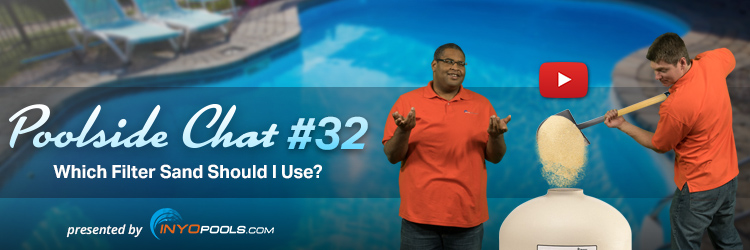

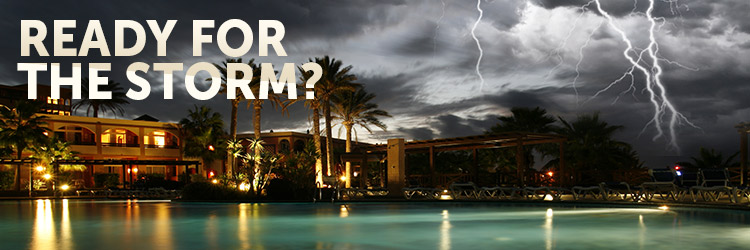
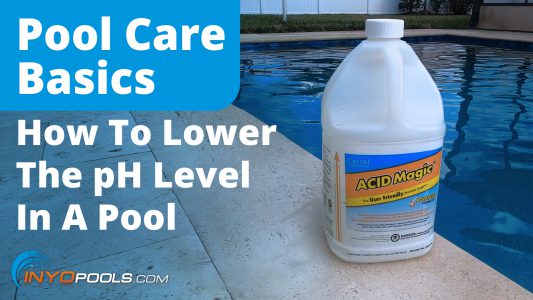






I have a “Secard” above ground pool and it has a brownish stain at and above the water line. What chemical can I use and what kind of brush, scrubber can I use to get it back to the blue it was? Help.
Before treating a stain, you have to figure out what kind of stain it is. This guide explains a few ways to ID the stain: How To Identify A Pool Stain. There are stain ID kits that make understanding a stain simple and give you a lead on how to correct it.
How can a white acrylic cool deck cleaned or rejuvenated? Have tried bleach type products and power washing.
Most commonly, cool deck cleaning consists of bleach and in some cases actual chlorine as it is stronger and pressure washing. However, if you use chlorine you may want to be careful not to kill any surrounding foliage.
The all around band on our Intex pool ripped (vertical). How can we repair that?
Unfortunately, I am not familiar with Intex models. You may want to contact them or one of their dealers.
Question
Have a salt water pool. Trying to find out if the zinc anode must be in contact with the water in addition to being connected to everything with the ground wire, or is simply connecting it to the copper wire used for bonding enough? People say you can leave it in moist soil, but not sure if it really should be in contact with the pool water as well.
It must be in contact with the water. There are zinc bricks that you can bolt to the pool basin, or there are plumbing attachments that hold an anode.
I am having a horrible time with mustard algae. Treated last week, back again in full force today. We are getting lots of rain.
Yellow algae is an extremely stubborn type of algae and may take a longer than usual shock period to completely clear it out. In addition to the standard process of cleaning a pool with algae bloom, we suggest Jack’s Magic Yellow Stuff or Coral Sea’s Yellow Out. Both are terrific at stamping out algae.
Matthew I’m looking at converting my 18×36 in ground pool to salt. Looking at the Hayward aqr-15 for 40,000 gal. It has 3 ft shallow end and 10 ft deep end. Do I have to change my sand filter out also? Reason being my Chlorine pool has been a nightmare this year and the water is still not right. The up front cost is ok with me for less of a headache. 900$ for the system is ok but if I have to change my sand filter I may rethink.
No, you can keep the filter. If you have had algae problems in the past, you can replace the sand while over to saltwater.
Hello, I just found you blog and I have a question. We inadvertently bought and installed pump for an above ground pool on an in-ground pool. So, of course you know what happened. My question is, is there any to be able to make this work or are we just stuck having to buy to proper pump.
Funny enough, we have an article on this subject. Take a look: Can I Install an Above Ground Pool Pump on an Inground Pool?
The short answer is, probably not.